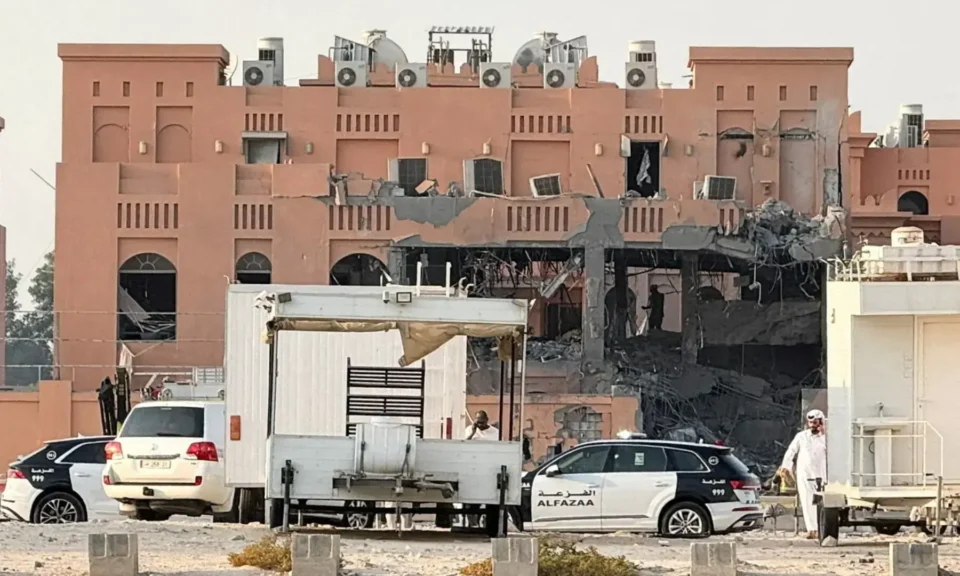Israel’s Strike on Doha Challenges US Security Guarantees in the Gulf
September 15, 2025
Israel’s recent strike in Doha has shaken assumptions that Gulf capitals remain protected under the American security umbrella. For decades, Gulf states believed Washington’s military presence would deter such actions. That belief has now been pierced, forcing leaders to question whether the US can still shield its allies in a rapidly shifting Middle East.
A Shock for Qatar and the GCC
The attack targeted Hamas leaders in Doha, crossing a line Gulf rulers once considered untouchable. Qatar, host of the US Central Command’s largest regional base at Al Udeid, found itself unexpectedly vulnerable.
The White House issued only a mild rebuke of Israel, with President Trump claiming Doha was given “last-minute notice” of the strike. Qatar dismissed the explanation, saying the warning came too late. The incident pushed Doha into politically uncharted waters, undermining its carefully built image as a neutral mediator in regional conflicts.
For years, Qatar’s reputation as a trusted broker had been its main tool for amplifying influence and offsetting geographic vulnerabilities. The Israeli strike directly undercut that strategy.
Gulf States Close Ranks
In response, Saudi Arabia and the UAE framed the incident as a challenge to collective Gulf security, invoking the GCC Joint Defence Agreement, which declares an attack on one member as an attack on all.
But this unity masks a dilemma: how can the GCC treat Israel’s strike on Qatar as a threat to all, while still maintaining security ties with Washington, the very partner that was supposed to prevent such attacks? The reality is now clear — for the US, some allies matter more than others.
US Security Umbrella Under Strain
The credibility of Washington’s security guarantees is now in doubt. The US military presence was never designed to deter Israeli attacks on Gulf territory — a blind spot that has become painfully obvious.
While Qatar and other GCC states remain dependent on US protection, they are exploring ways to supplement their defences. Options include:
-
Strengthening joint GCC air defence and early-warning systems
-
Expanding cooperation with European and Asian suppliers for missile protection
-
Establishing regional red lines against strikes on Gulf soil
For now, alternatives like Chinese or Russian security patronage are neither practical nor desirable, and even regional security arrangements with Turkey, Egypt, or Pakistan cannot function without US approval.
Doha’s New Reality
Qatar, once the mediator of choice in regional conflicts, has now become a victim of the very war it sought to help resolve. Its immediate priority is to restore credibility as a mediator while hardening security around future negotiations.
Doha is pressing Washington to restrain Israel and to reinforce the value of the “Doha channel” for dialogue. Yet, Israel’s risk-heavy approach suggests it is committed to a military-only path, leaving Qatar with fewer guarantees of protection.
What Lies Ahead for the Gulf?
The strike on Doha is more than a violation of sovereignty — it is a stress test for the Gulf’s entire security framework. Condemnations alone will not deter future attacks. The region now faces tough choices:
-
Should the GCC redefine its security arrangements beyond US guarantees?
-
Can Gulf states afford to let their capitals become part of Israel’s expanded conflict zone?
-
Will Qatar continue hosting sensitive negotiations if its neutrality cannot be safeguarded?
Bottom Line
Israel’s attack on Doha has exposed cracks in the decades-old US–Gulf security partnership. Outrage without deterrence is meaningless. For the Gulf, this moment demands concrete action — tighter defence cooperation, credible deterrence measures, and a collective response that restores balance.
For Washington, the message is equally urgent: if the US cannot restrain an ally from striking another ally’s capital, its security assurances risk losing all credibility in the Middle East.
👉 Key Takeaway: The Gulf is entering a new security era. For Qatar, the decisive question now is simple but profound: to host, or not to host?

